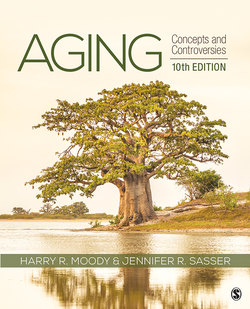Читать книгу Aging - Harry R. Moody - Страница 56
На сайте Литреса книга снята с продажи.
The Meaning of Aging in the 21st Century
ОглавлениеThe life course perspective views stages of life as social constructions reflecting broader structural conditions of society. As conditions change, so will our view of how people find meaning at different stages of life. Consider the weakening of age norms and beliefs about what is “appropriate” for different stages of life. In a world where retired people may go back to college or where a woman may have her first child at age 40, it makes less sense to link education or work with strict chronological ages. Indeed, one attractive strategy for an aging society might well be to introduce more flexibility for people of all ages to pursue education, work, and leisure over the entire course of life, rather than link these activities normatively to periods of youth, middle life, and old age, as modern societies have done in the past.
It is not clear how the meaning of old age will change in contemporary postindustrial societies. On the one hand, older Americans have achieved gains in income levels, health, and political power. On the other hand, as the stages of life have evolved and become blurred, the entire image of old age is giving way to more of an “age-irrelevant” image of the life course (Neugarten, 1983). As an empirical matter, chronological age, by itself, loses predictive value and importance for many purposes. However, given that age discrimination is far from eradicated, it seems that age—and aging—continues to be quite relevant.
Does this trend mean that old age, as a distinct stage of life, no longer has any special meaning or significance? Here, we again must distinguish between a meaning that society ascribes to old age and what individuals find meaningful in their own lives. In postmodern culture, it is increasingly difficult to ascribe anything special to the last stage of life. But if nothing special is to be found in later life, we wonder, does it follow that personal meaning in old age must simply be “more of the same,” that is, continuing whatever values gave meaning earlier in life? Is old age becoming but an extension to or the tale-end of midlife? Or does lifelong growth imply a constant effort to overcome old habits and change our view of what offers meaning in life—perhaps by composing a new version of our life story (Bateson, 2011)? These questions have no easy answers but are important to consider.
